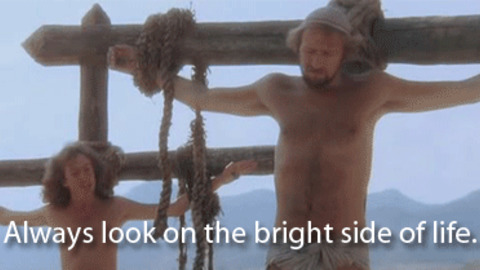I'm reading through Joan Taylor's edited volume, Jesus and Brian: Exploring the Historical Jesus and his Times via Monty Python's Life of Brian (London: Bloomsbury T&T Clark, 2015). This is such an interesting book. As with any edited volume, some of the essays exhibit higher quality than others, though judging between them probably also depends on the reader. But in her essay (one of the best I've read so far), Helen Bond examines two different kinds of humor in relation to crucifixion in the ancient world: parody/mockery of the victim, on one and, and gallows humor, on the other.
In her discussion of "gallows humor," Helen Bond relates a story told by Strabo (Geography 3.4.18), in which "Spanish prisoners after the Cantabrian wars who continued to sing victory songs, even when nailed to their crosses" ("'You'll Probably Get away with Crucifixion': Laughing at the Cross in Brian and the Ancient World," 113–26 [p. 121]). For Strabo, the victims' singing is a sign of their madness, but Bond offers a different perspective: "[F]rom the prisoners' point of view, it's easy to see their songs as a final act of defiance, as a way of strengthening morale, and a last laugh in the face of Roman oppression. There's something heroine about these wild Cantabrians, unwilling to be snuffed out by Rome" (121).
Okay, here's the observation promised in this post's title: In Spanish, canta is an imperative verb that means, "Sing!" (the exclamation point meant to convey a sense of command), and so "canta, Brian" would be a command to Brian: "Sing, Brian!"
Cantabrian victims of crucifixion singing while on their crosses, in the context of a discussion of Monty Python's Life of Brian and the crucifixion victims' singing, "Always look on the bright side of life," and the Spanish phrase "canta Brian"; it all just fits together nicely . . .



From Dr G:
ReplyDeleteThese were well-educated boys; Cambridge, Oxford. Terry Jones, co-writer and director, was well known for knowing lots about everything, including medieval history. It would be interesting to know if Life of Brian was in part riffing, punning, on some half-remembered oddity in ancient history, relating to crucifixion.
Indeed. They were brilliant on multiple levels (not just in terms of humour)!
DeleteWe're told that the working notes for Life of Brian eventually added up to enough material for a movie several days long. Maybe some researcher should locate those notes if they are still around. And see what's there.
DeleteThe play on language reminiscent of James Joyce. And later, Postsructuralism. And the theory that our lives are so dominated by language, that we ourselves, our minds, are just nodes of the entire language, the larger social text, of the greater culture. Its many books and sayings and words. With their odd/"funny" interconnections.